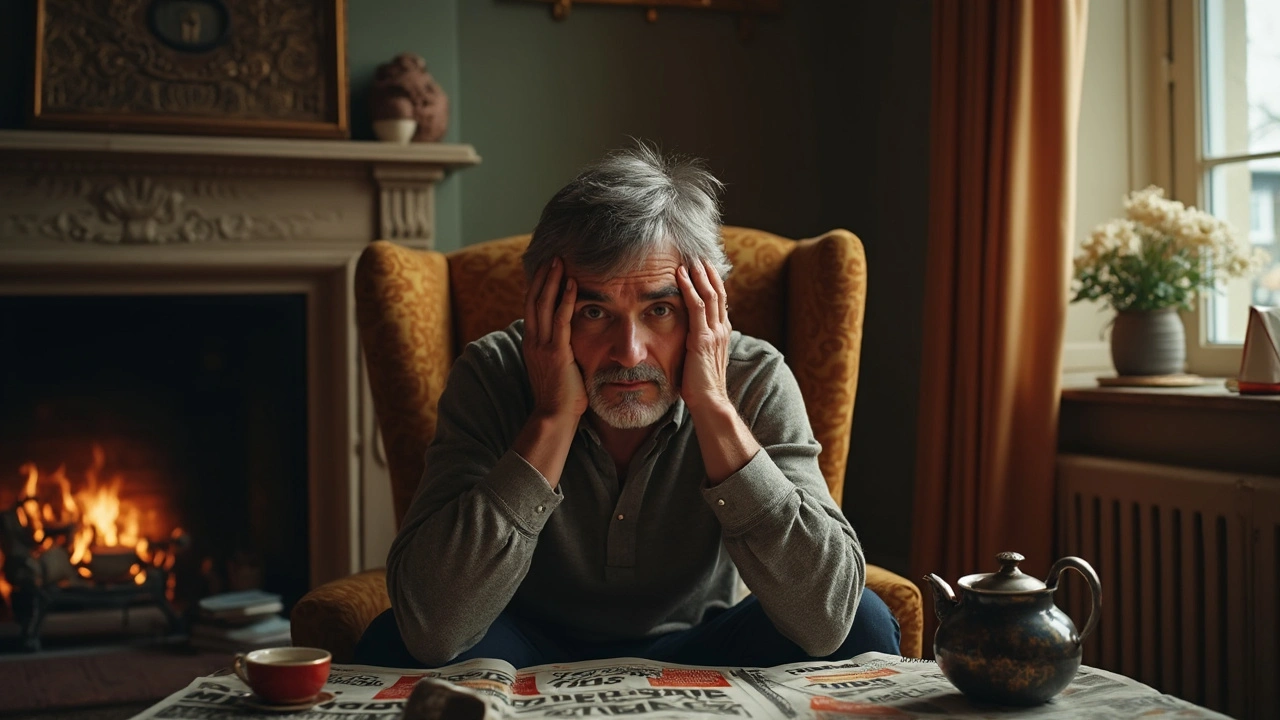Ever caught yourself googling symptoms and ended up convinced you've got a life-threatening illness? You're not alone. This kind of worry, known as health anxiety, goes beyond the usual concern for health. It's like having a nagging voice in your head that just won't quiet down.
Health anxiety can make everyday life feel like walking on a tightrope. Suddenly, a simple headache spirals into fears of a brain tumor, or a benign bump becomes something much scarier. The mind jumps to worst-case scenarios, fueled by the information overload from the internet and perhaps a history of health scares.
But here's the thing—understanding health anxiety is the first step to managing it. Whether it's skimming through online articles or fixating on bodily sensations, this constant worry can take a big toll on your mental peace. And that's why it's important to know how to recognize it and what to do about it.
- What is Health Anxiety?
- Recognizing the Symptoms
- Why Health Anxiety Occurs
- Impact on Daily Life
- Self-help Tips
- Professional Treatments
What is Health Anxiety?
Health anxiety, often referred to as illness anxiety disorder, is when you excessively worry about your health to the point it disrupts daily life. It’s not just being a little more cautious—it's a full-on anxiety disorder that's as much about the mind as it is about the body.
This type of anxiety is characterized by an intense fear of having a serious illness, even when there is little or no medical evidence to support such concerns. People with health anxiety might misinterpret normal bodily sensations as signs of severe illness. Imagine interpreting a common cold as a sign of something far worse, and you'll get the picture.
Why does it happen? Well, this anxiety often kicks in after experiencing a major health scare, either personally or through someone close. But it can also spring up from constant exposure to medical information, the kind that’s everywhere these days, thanks to the internet.
People struggling with health anxiety tend to frequently check their body for signs of illness, constantly seek reassurance from doctors, or avoid medical help altogether out of fear of bad news. You might find yourself in a never-ending cycle of online symptom-checking, which does more harm than good, feeding the anxiety beast.
- Excessive worry about health for at least six months.
- Frequent checking of body for signs of illness.
- Regular doctor visits for reassurance, or complete avoidance of doctors.
- Misinterpretation of bodily symptoms.
Knowing about health anxiety is crucial for those feeling trapped in this loop of worry. The good news is, understanding it better can lead to managing it better, too.
Recognizing the Symptoms
Spotting anxiety symptoms related to health anxiety is crucial because they can really play tricks on you. It's not just about feeling worried about your health once in a while — it's the persistence and intensity that matter.
One common symptom is a relentless obsession with bodily functions or sensations. You might find yourself constantly scanning your body for anything odd or different. In ordinary daily activities, like sitting at your desk or watching TV, you could suddenly become acutely aware of your heartbeat or a slight twitch and spiral into anxiety.
Another sign of health anxiety is frequent doctor visits without any real health problem being diagnosed. You might feel relief in the moment, but the worries usually come back quickly. This can be really draining — both emotionally and financially. Some people with health anxiety might avoid doctors altogether out of fear of hearing bad news, which is a paradoxical twist.
Checking the internet excessively for one's symptoms is also quite typical. You know how it goes — you start with a headache and six articles later, you're convinced of something dire. This, of course, only ramps up the anxiety further.
Physical symptoms often accompany mental stress, too. It can be a whirlwind of palpitations, dizziness, or muscle tension. These aren't just 'in your head' — they're very real sensations caused by the stress response.
One study of people with health anxiety found that their top concerns often emphasize diseases like cancer and heart disease. It's as though the mind naturally zeros in on these feared illnesses. Here's a simple breakdown based on a small study:
| Concerned Illness | Percentage |
|---|---|
| Cancer | 70% |
| Heart Disease | 55% |
| Brain Disorders | 40% |
If any of this sounds familiar, it's important to remember you're not alone, and there are ways to manage and reduce this kind of anxiety. Recognizing the symptoms is just the first step in taking control.
Why Health Anxiety Occurs
Ever wonder why health anxiety gets such a strong grip on some folks? It's more common than you think and it often starts with a mix of personality traits, personal experiences, and a little bit of how our brains are wired.
People with a knack for noticing every little body twinge or change tend to be more prone to health anxiety. If you're naturally more focused on your feelings and sensations, this might sound familiar. Yet, it's not just about being extra careful.
Past health scares or experiences of illness, either personally or observed in loved ones, can set this anxiety in motion. Imagine dealing with a serious illness and, later on, every small symptom brings that fear rushing back. It's not just your imagination; it's your brain being overly cautious because it's been through the wringer before.
Believe it or not, sometimes even too much information can be a problem. With everything just a search away, Googling symptoms can quickly drown you in a sea of worst-case scenarios. This kind of 'Dr. Google' diagnosis tends to ramp up stress and anxiety, adding fuel to the fire.
Another factor? Our brain chemistry. Yep, neurotransmitters like serotonin, which play a big role in mood and anxiety levels, can be off-kilter in those wrestling with this kind of anxiety. It’s a physical thing as much as it is a mental game.
Put it all together—sensitive personality traits, past experiences, information overload, and brain chemistry—and you've got a recipe for anxiety symptoms that manifest as health concerns. But recognizing these causes can actually help you tackle them head-on, paving the way for better mental health control.

Impact on Daily Life
If you've ever wrestled with health anxiety, you know it can sneak into almost every part of your day. It's like an uninvited guest that overstays its welcome, affecting both your mind and body.
Let's start with mental load. Imagine constantly monitoring every little ache and twinge, which can turn regular activities into major stress points. This can lead to avoiding places or activities where you fear your anxiety might flare up, effectively shrinking your world.
Relationships can take a hit too. Friends and family might not get why you're so fixated, leaving you feeling isolated. Carol A. Bernstein, M.D., a past president of the American Psychiatric Association, says,
"The constant need for reassurance can put a strain on personal relationships."It's true—endless inquiry and seeking validation can exhaust even the closest connections.
Professional life isn't immune either. Health anxiety can make it hard to focus, leading to dips in productivity. It's tough being your best self at work when you're distracted with what could be going wrong inside your body.
The physical toll is equally taxing. Stress from anxiety can mess with your sleep, diet, and overall health, sometimes triggering a vicious cycle of more symptoms and more worry.
| Aspect | Impact |
|---|---|
| Mental Load | Constant self-checking and worry |
| Relationships | Need for reassurance straining bonds |
| Work | Reduced focus and productivity |
| Physical Health | Sleep disturbances and stress symptoms |
Dealing with health anxiety means finding ways to manage these impacts so life can be more about living, not just fearing. Remember, you're not alone in this, and taking steps, no matter how small, can help you regain balance.
Self-help Tips
Living with health anxiety can feel like battling an invisible enemy. The good news? There are ways to manage it that can empower you to take control of your thoughts and feelings.
First off, understanding your triggers is crucial. Think about what prompts your health anxiety. Is it a particular sensation, a news article, or a friend's story? Knowing what sets off your anxiety can help you avoid those triggers or at least prepare for them.
Another tip is to challenge your negative thoughts. When your mind leaps to the worst-case scenario, take a step back. Ask yourself, "What's the evidence for this?" Try to lean towards more balanced thinking. It's not about ignoring your concerns, but rather seeing them in a more realistic light.
Distraction techniques can also be your best friends. Engaging in activities like exercise, hobbies, or talking to a friend can break the cycle of repetitive anxious thinking. Physical activity, especially, has been shown to reduce anxiety levels because it boosts the production of endorphins, which are natural mood lifters.
Practicing relaxation exercises is also key. Simple deep-breathing techniques or guided meditations can help calm that racing heart and quieten an overactive mind. Consider setting aside a few minutes each day for these practices, making them part of your routine.
- Exercise Regularly: Aim for at least 30 minutes of moderate activity most days of the week.
- Mindfulness and Meditation: Apps like Headspace or Calm can guide you through daily practices.
- Limit Information Intake: Consider setting time limits on health-related searches online.
- Journaling: Write down your worries and then challenge them with facts.
Building a support system is another effective strategy. Talk to someone who understands what you're going through. Sharing your thoughts can often diffuse the intensity of your worries.
Remember, managing health anxiety takes patience and practice. It's all about finding what works for you and taking small, manageable steps towards a more balanced approach to your health and well-being.
Professional Treatments
If health anxiety feels like it's running the show, seeking professional help can be a real game-changer. A therapist or psychologist can guide you to understand and manage your anxiety symptoms through tailored treatment plans.
Cognitive Behavioral Therapy (CBT) is often the go-to approach. This therapy helps you recognize the patterns of thought that lead to anxiety and teaches you to develop healthier ways of thinking. Imagine reshaping those spiraling thoughts into something more balanced. CBT sessions usually involve working through scenarios and behaviors that generate fear, gradually helping you respond differently.
Another option is medication. While it might sound a bit daunting, medication prescribed by a psychiatrist can help stabilize the imbalance of chemicals in the brain that contributes to anxiety. Common options include selective serotonin reuptake inhibitors (SSRIs) and benzodiazepines, but these come with their pros and cons. Discussing with a medical professional is key to finding what works for you.
Some people also benefit from mindfulness-based therapies. Being present and aware without judgment can reduce worry by keeping you grounded in the here and now. It’s like taking a breather from the endless cycle of health concerns.
For those seeking a blend of support, group therapy can be beneficial. Sharing experiences with others facing similar challenges may provide comfort and practical tips. It's a space where you realize you’re not alone in this journey.
Here’s a quick look at some stats:
| Treatment | Success Rate |
|---|---|
| Cognitive Behavioral Therapy | 60-80% |
| Medication (SSRIs) | 50-70% |

